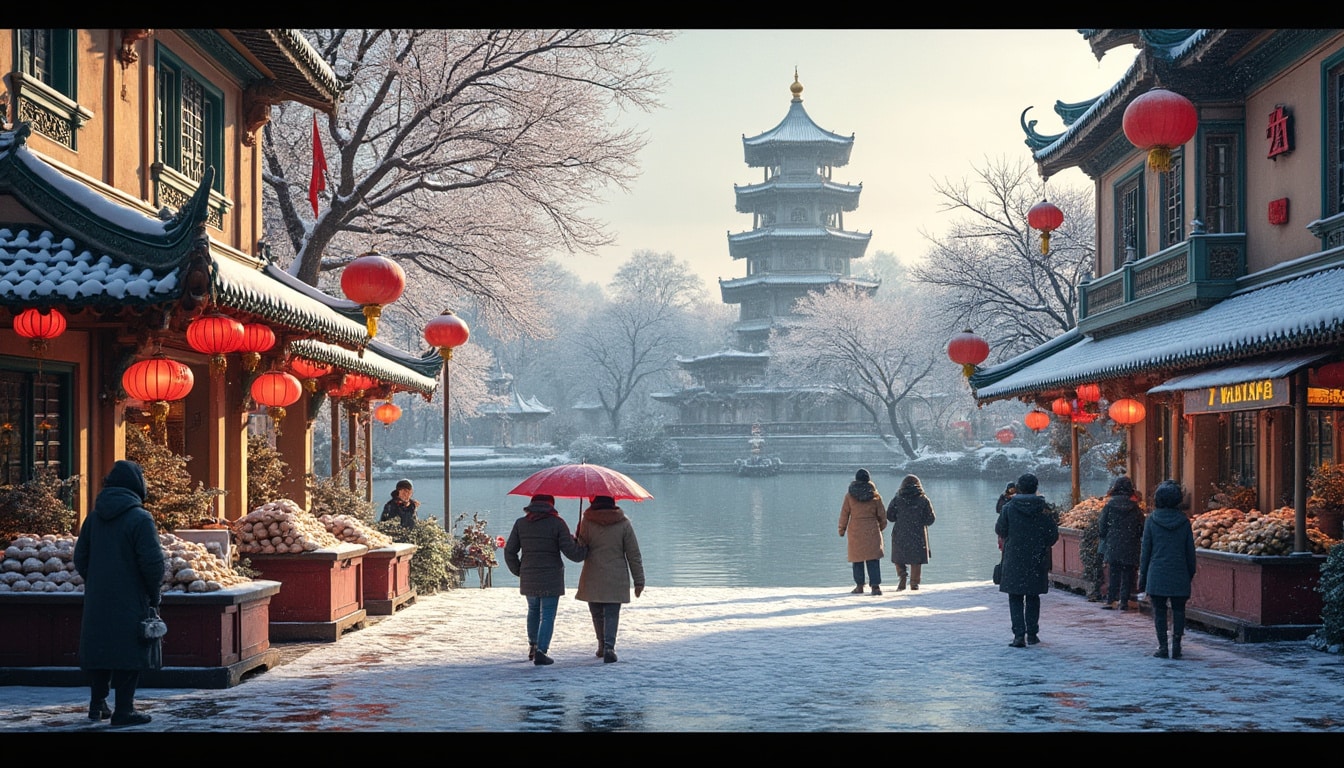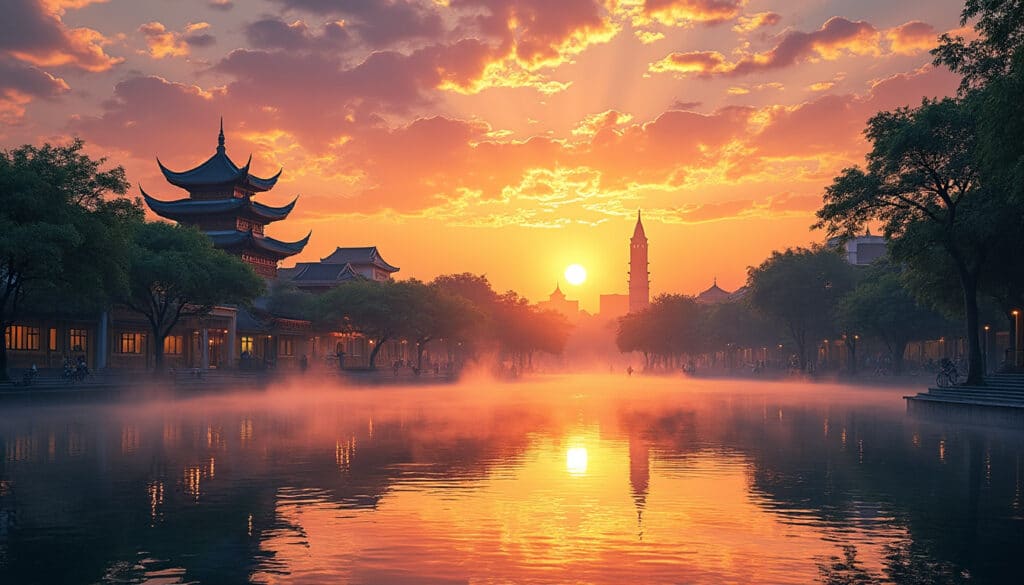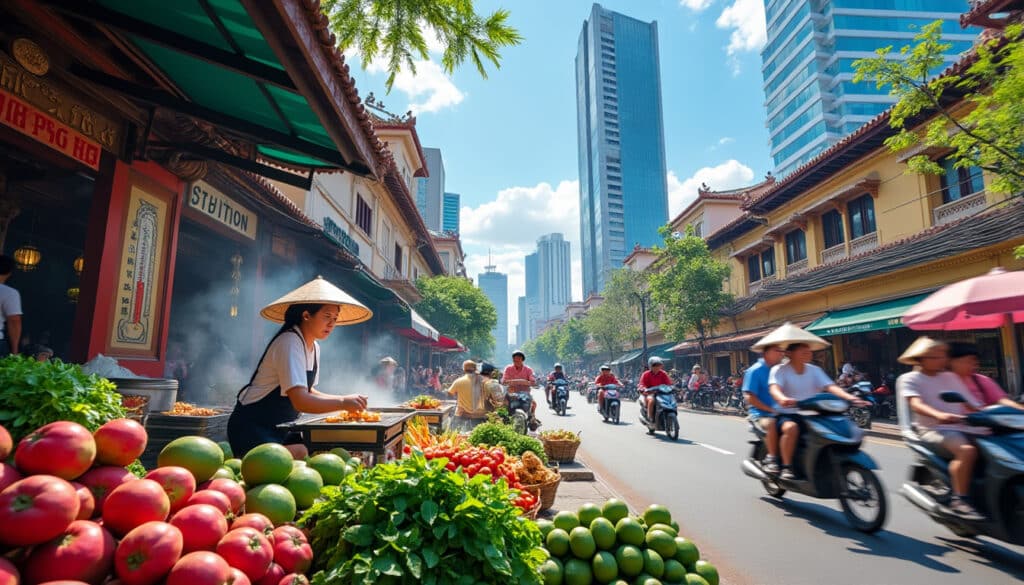Hanoi, known for its bustling streets and rich cultural tapestry, may not be the first place that comes to mind when thinking of snow. The capital of Vietnam is renowned for its vibrant street food, historical landmarks, and lively markets rather than snowy landscapes. However, as curiosity often stirs, many wonder about the possibility of snow gracing this Southeast Asian city. In understanding Hanoi’s weather patterns, travelers and residents alike can better appreciate the nuances of its climate while dispelling the myths surrounding snowfall in this iconic city.
The Climate of Hanoi: A Tropical Experience
Hanoi is located in the northern part of Vietnam and is characterized by its tropical climate. This means Hanoi experiences two primary seasons: a hot, wet season and a cooler, dry season. The wet season typically spans from May to September, bringing with it high humidity and frequent rain showers. These conditions create a lush, green environment but make snowfall virtually impossible during this time.
From October to April, Hanoi enters its dry season, with temperatures generally cooler than in the wet season. This period features mild and pleasant weather, making it the peak time for tourists to visit. However, despite the cooler temperatures, Hanoi rarely dips to the freezing point required for snow to form.
- 🌡️ Average annual temperature in Hanoi: 23.6°C (74.5°F)
- 🌨️ Chance of snow in Hanoi: Virtually zero
- 💧 Average annual rainfall: 1,680 mm
Due to Hanoi’s flat geography and its position at low altitude, temperatures remain moderate, even during the coldest months of January and February. These months are characterized by temperatures that can drop as low as 10°C (50°F) at night, but this is still far too warm for snow to make an appearance.
| Month | Average High (°C) | Average Low (°C) | Rainfall (mm) |
|---|---|---|---|
| January | 19°C | 13°C | 18 mm |
| July | 33°C | 26°C | 288 mm |
| December | 21°C | 15°C | 25 mm |

The climate of Hanoi ensures a unique experience where instead of snow, visitors and locals enjoy the chilly yet comfortable winters. The distinct seasons contribute to the rich agricultural produce and lively festivals that highlight Hanoi’s charm.
The Urban Legend of Snow in Hanoi
Despite scientific data dissuading the expectation of snowfall, the allure of a surprise snow day in Hanoi lingers as an urban legend. Anecdotal stories occasionally surface, much to the delight of snow enthusiasts. However, these stories often originate from misunderstandings or rare occurrences of frost in higher altitude areas outside of Hanoi itself, particularly in the mountainous regions to the north.
Regions such as Sapa and Fansipan Mountain, located in northern Vietnam, are the true bastions of snow within the country. These areas reach altitudes where snowfall is more plausible. For those seeking a winter wonderland, these destinations offer a glimpse into Southeast Asia’s rare snowy scenes.
The persistent myth of snow in Hanoi can partly be attributed to the city’s occasional cold snaps. These periods are brief and may bring unusually cold temperatures for the region, but still not enough to cross the threshold required for ice and snow.
Exploring Winter in Northern Vietnam
While Hanoi might not be a snow destination, nearby regions provide an escape for those eager to encounter snow in Vietnam. Northern Vietnam is dotted with mountainous areas and high-elevation locales that offer the potential for snow and winter sports escapades.
One of the most popular destinations for snow enthusiasts in Vietnam is Sapa, located in Lao Cai Province. Sapa’s elevation, coupled with its geographical position, makes it one of the few places in Vietnam where snow is possible during the colder months. Visitors to Sapa can sometimes experience snowflakes, generally fleeting but awe-inspiring nonetheless.
- 🗻 Sapa – Renowned for its stunning terraces and cultural richness
- 🌨️ Fansipan Mountain – The highest peak in Vietnam, occasionally receives snow
- 🚞 Y Ty Pass – Scenic route offering breathtaking views combined with the chance to witness snow
For a memorable winter adventure, visitors can ride the cable car to the top of Fansipan and relish views of snow-dusted landscapes. Accessible routes such as the Y Ty Pass allow travelers to explore the region’s beauty while searching for glimpses of snow.
If the crisp mountainous air isn’t enough to keep you warm, traditional rice wine, commonly known as “ruou can,” is a popular way to stay toasty amidst the chilly winds. The unique experience of snow-viewing paired with local cultural experiences makes a trip to northern Vietnam fulfilling even during winter.
Modern Day Treasures and Outdoor Gear
For those planning to chase snow in Vietnam, packing suitable gear is crucial. While Hanoi remains snow-free, preparation for a snowy adventure in the northern regions is essential. Brands well-regarded for winter apparel (such as North Face, Columbia, Patagonia, and others) provide necessary clothing to ensure comfort in cold and wet conditions.
Considering the rapid shifts in weather within the mountainous areas, gearing up with high-quality outdoor attire can vastly enhance the experience. Here’s a checklist of recommended gear for winter expeditions in Northern Vietnam:
- 🧥 Parkas and Jackets: Look for options from North Face or Patagonia for warmth and insulation.
- 🧤 Gloves: Essential for handling the cold; check out selections from Marmot and Spyder.
- 🧦 Thermal Socks: Keep your feet warm with selections from Helly Hansen.
- 🥾 Waterproof Boots: Snow Peak and Columbia offer great choices to manage slippery terrains.
No snowy trek is complete without some specialized equipment. Popular brands such as REI and Mountain Hardwear provide tools and apparel to facilitate hiking and exploration in winter terrains. The variety of gear available ensures that each excursion can be approached safely and comfortably.
Alternative Winter Attractions in Hanoi
Although snow isn’t on the itinerary, Hanoi provides numerous engaging winter activities and experiences for travelers seeking a seasonal flair without needing the white spectacle. Hanoi offers a vibrant contrast to the winter cold, boasting a collection of events and destinations that thrive during the cooler months.
One of these remarkable experiences includes the flower markets in Hanoi, where the dreariness of winter is countered by the vivid display of blooms. Flower lovers should not miss the chance to visit the Quang Ba Flower Market, a colorful oasis filled with chrysanthemums and peach blossoms, signaling an early arrival of spring.
- 🌺 Quang Ba Flower Market – A vibrant collection of colors and scents.
- 🎼 Hanoi Opera House – Hosts a variety of performances throughout the cooler months.
- 🏯 Thang Long Imperial Citadel – A UNESCO World Heritage Site best enjoyed in the crisp air.
Wintertime is also celebrated through culinary delights. Vietnamese street food staples such as pho and banh mi are complemented by seasonal dishes like hotpot and grilled meats. These meals provide warmth and indulgence, bringing comfort alongside Hanoi’s praised hospitality.
Although snow isn’t on the menu, Hanoi’s winter offers a cultural feast that immerses visitors in traditions, cuisine, and festivities unique to the city. By exploring these cultural experiences, visitors can gain insights into Hanoi’s festive spirit during the winter months.
Celebrating Tet: The Lunar New Year
If there’s a time that truly encapsulates the wonder of Hanoi during the winter, it’s Tet—the Vietnamese Lunar New Year. Occurring around late January or early February, Tet is a festive season replete with family gatherings, special foods, and vibrant celebrations.
Traditionally, families decorate their homes with peach blossom trees, kumquat plants, and red banners. Culinary delights feature prominently with Tet specialties, including banh chung (square sticky rice cakes) and gio lua (Vietnamese pork sausage).
- 🎊 Flowers and Plants: Homes are adorned with blooms and lush greenery indicating prosperity.
- 🍘 Banh Chung: A Tet favorite, deep-rooted in Vietnamese tradition.
- 👨👩👧👦 Family Reunions: A time to honor ancestors and strengthen family bonds.
Tet celebrations bring Hanoi to life with parades, lion dances and fireworks, offering a vibrant welcome to the lunar new year. Witnessing this transcendent celebration provides an understanding of the cultural depth and community spirit that defines Hanoi.
FAQs About Snow and Winter in Hanoi
- Does Hanoi ever get snow?
No, Hanoi’s tropical climate does not allow for snowfall. - When is the best time to experience winter in Hanoi?
Visit between December and February for the coolest temperatures. - Where can I experience snow in Vietnam?
Head to northern locales like Sapa and Fansipan Mountain for the possibility of snow. - What should I pack for a winter trip in Vietnam?
Pack warm layers, waterproof gear, and thermal accessories from brands like North Face or Columbia. - What are some winter activities in Hanoi?
Explore cultural sites, enjoy local street food, and partake in Tet celebrations.

The city of Hanoi, a bustling hub of culture and history, offers a distinctive climate that shapes its daily life. Nestled in the heart of Vietnam, Hanoi experiences a variety of weather conditions, from humid summers to mild, dry winters.…

Hanoi, the vibrant capital city of Vietnam, not only captivates visitors with its rich cultural heritage and delectable street food but also with a unique climatic variation that sees the city shivering under cold weather conditions during certain months of…

Flooding and natural risks in Hanoi
Flooding Challenges and Natural Risks in Hanoi The vibrant city of Hanoi, known for its unique blend of age-old traditions and rapid urban growth, is no stranger to water-related challenges. Nestled along the banks of the Red River, Hanoi experiences…

As the summer sun climbs higher in the sky, the bustling streets of Hanoi transform under the play of light and shadow, painting a vivid tableau of life in Vietnam’s dynamic capital. Known for its rich cultural heritage and vibrant…

Hanoi, the vibrant capital of Vietnam, is renowned for its rich history, tantalizing street food, and intriguing blend of traditional and modern cultures. However, one of the most defining yet challenging aspects of living or traveling in Hanoi is its…
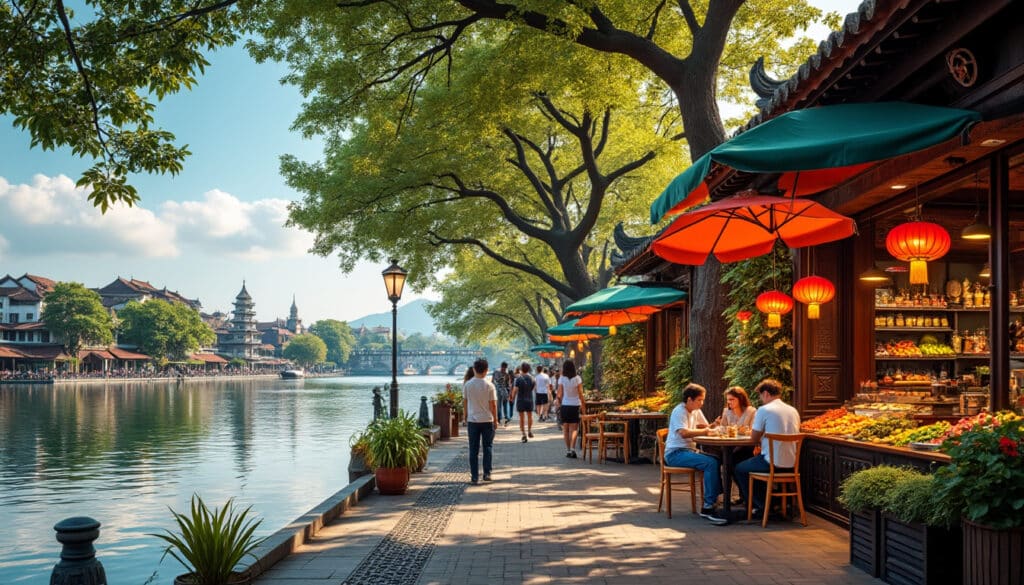
Is Hanoi warm throughout the year?
Hanoi, the vibrant capital of Vietnam, showcases a spectrum of weather conditions throughout the year, thanks to its unique geographic location. Encompassing the vivacious street life and the rich history of the city, understanding its climate is essential for both…
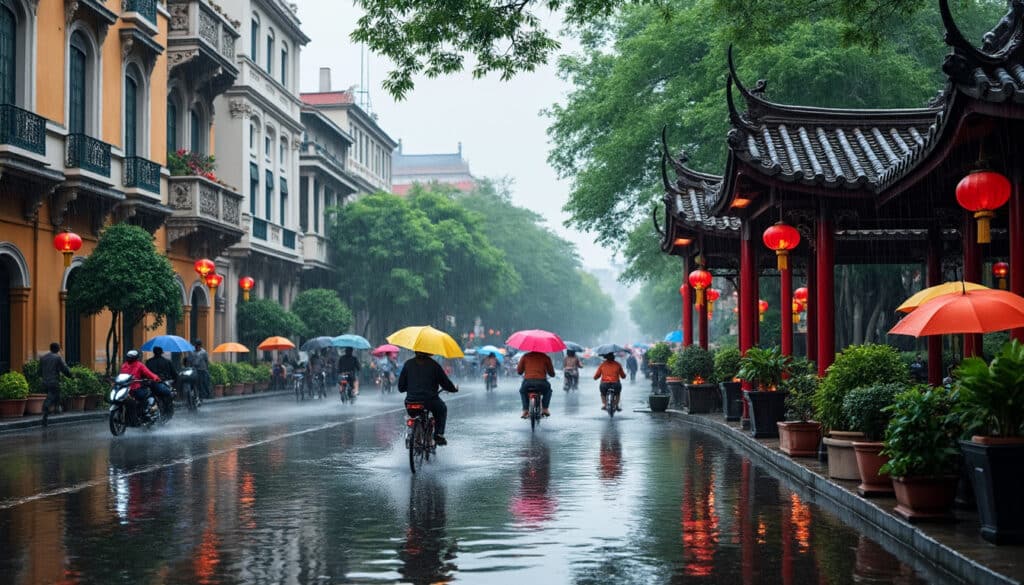
Rain and precipitation in Hanoi
Renowned for its vibrant streets, exquisite cuisine, and rich cultural history, Hanoi, the bustling capital of Vietnam, also presents weather patterns worth exploring. The city’s climate plays a crucial role in shaping its everyday life and the experience of both…
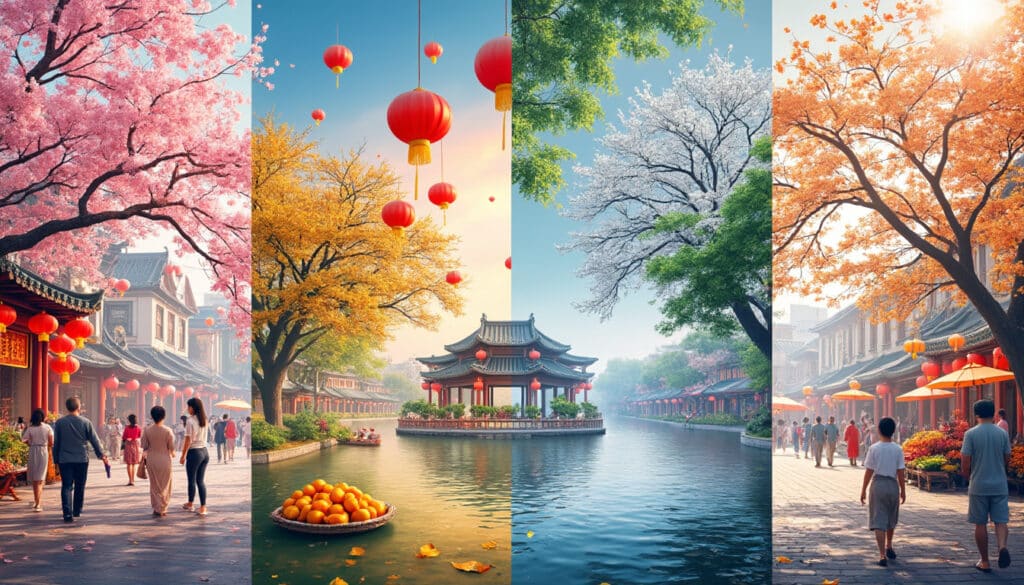
Hanoi, the captivating capital of Vietnam, is a place where the past seamlessly merges with the present. This city offers a unique blend of rich history, vibrant culture, modernity, and a distinct four-season climate, making it an exciting destination for…
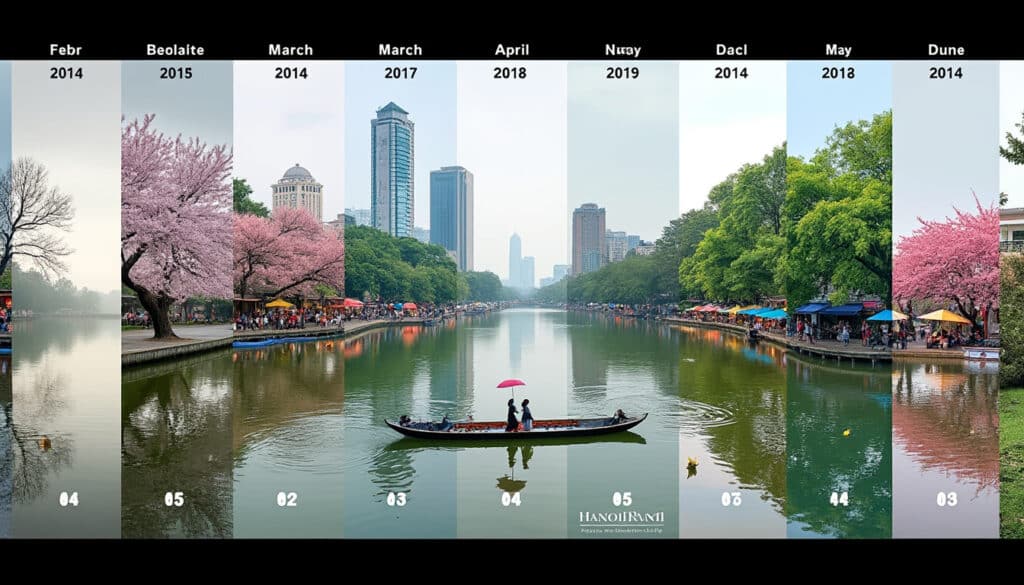
Hanoi, the vibrant capital city of Vietnam, is known for its unique weather patterns that change remarkably over the months. Whether it’s the cool breeze whispering through Hoan Kiem Lake in January or the heavy rains nurturing tropical greenery in…
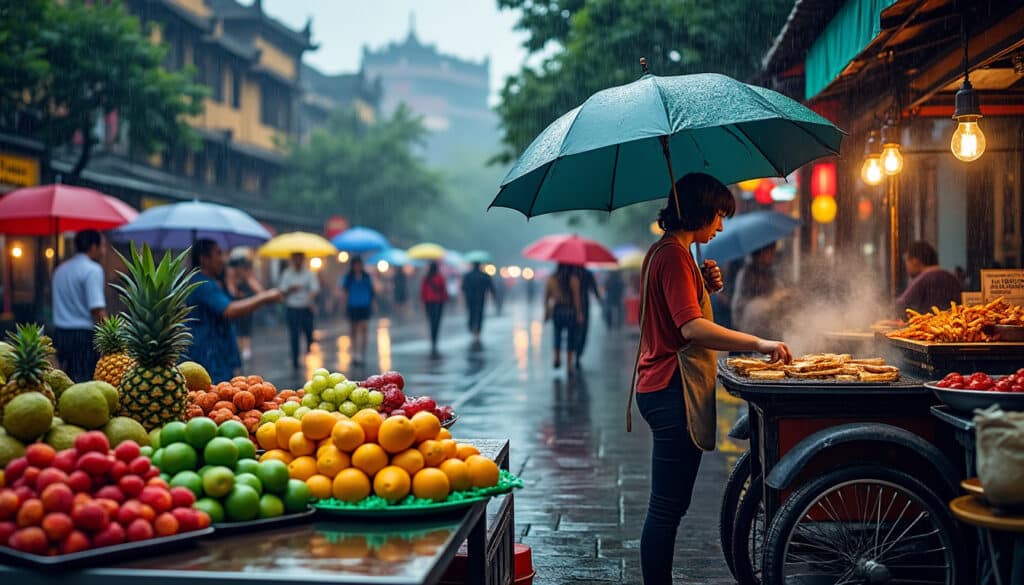
What is the weather like in Hanoi?
Hanoi is known for its vibrant street life, rich history, and diverse cuisine. Yet, understanding its weather patterns is crucial for enjoying all the city has to offer. Hanoi’s climate is characterized by hot, humid summers and cool, dry winters,…

